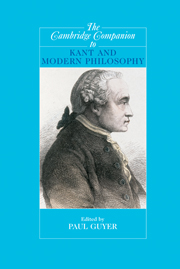Book contents
- Frontmatter
- Introduction: The starry heavens and the moral law
- 1 “A Priori”
- 2 Kant on the perception of space (and time)
- 3 Kant’s philosophy of mathematics
- 4 Kant on a priori concepts: The metaphysical deduction of the categories
- 5 Kant’s philosophy of the cognitive mind
- 6 Kant’s proofs of substance and causation
- 7 Kant and transcendental arguments
- 8 The critique of metaphysics: The structure and fate of Kant’s dialectic
- 9 Philosophy of natural science
- 10 The supreme principle of morality
- 11 Kant on freedom of the will
- 12 Mine and thine? The Kantian state
- 13 Kant on sex and marriage right
- 14 Kant’s theory of peace
- 15 Kant’s conception of virtue
- 16 Kant’s ambitions in the third Critique
- 17 Moral faith and the highest good
- 18 Kant’s critical philosophy and its reception - the first five years (1781-1786)
- Bibliography
- Index
3 - Kant’s philosophy of mathematics
Published online by Cambridge University Press: 28 March 2007
- Frontmatter
- Introduction: The starry heavens and the moral law
- 1 “A Priori”
- 2 Kant on the perception of space (and time)
- 3 Kant’s philosophy of mathematics
- 4 Kant on a priori concepts: The metaphysical deduction of the categories
- 5 Kant’s philosophy of the cognitive mind
- 6 Kant’s proofs of substance and causation
- 7 Kant and transcendental arguments
- 8 The critique of metaphysics: The structure and fate of Kant’s dialectic
- 9 Philosophy of natural science
- 10 The supreme principle of morality
- 11 Kant on freedom of the will
- 12 Mine and thine? The Kantian state
- 13 Kant on sex and marriage right
- 14 Kant’s theory of peace
- 15 Kant’s conception of virtue
- 16 Kant’s ambitions in the third Critique
- 17 Moral faith and the highest good
- 18 Kant’s critical philosophy and its reception - the first five years (1781-1786)
- Bibliography
- Index
Summary
In his Critique of Pure Reason, Kant proposes to investigate the sources and boundaries of pure reason by, in particular, uncovering the ground of the possibility of synthetic a priori judgments: “The real problem of pure reason is now contained in the question: How are synthetic judgments a priori possible?” (Pure Reason, B 19). In the course of answering this guiding question, Kant defends the claim that all properly mathematical judgments are synthetic a priori, the central thesis of his account of mathematical cognition, and provides an explanation for the possibility of such mathematical judgments.
In what follows I aim to explicate Kant's account of mathematical cognition, which will require taking up two distinct issues. First, in sections 2 and 3, I will articulate Kant's philosophy of mathematics. That is, I will identify the conception of mathematical reasoning and practice that provides Kant with evidence for his claim that all mathematical judgments are synthetic a priori, and I will examine in detail the philosophical arguments he gives in support of this claim. Second, in section 4, I will explain the role that Kant's philosophy of mathematics - and, in particular, his claim that mathematical judgments are synthetic a priori - plays in his critical (transcendental) philosophy.
- Type
- Chapter
- Information
- The Cambridge Companion to Kant and Modern Philosophy , pp. 94 - 128Publisher: Cambridge University PressPrint publication year: 2006
- 14
- Cited by



